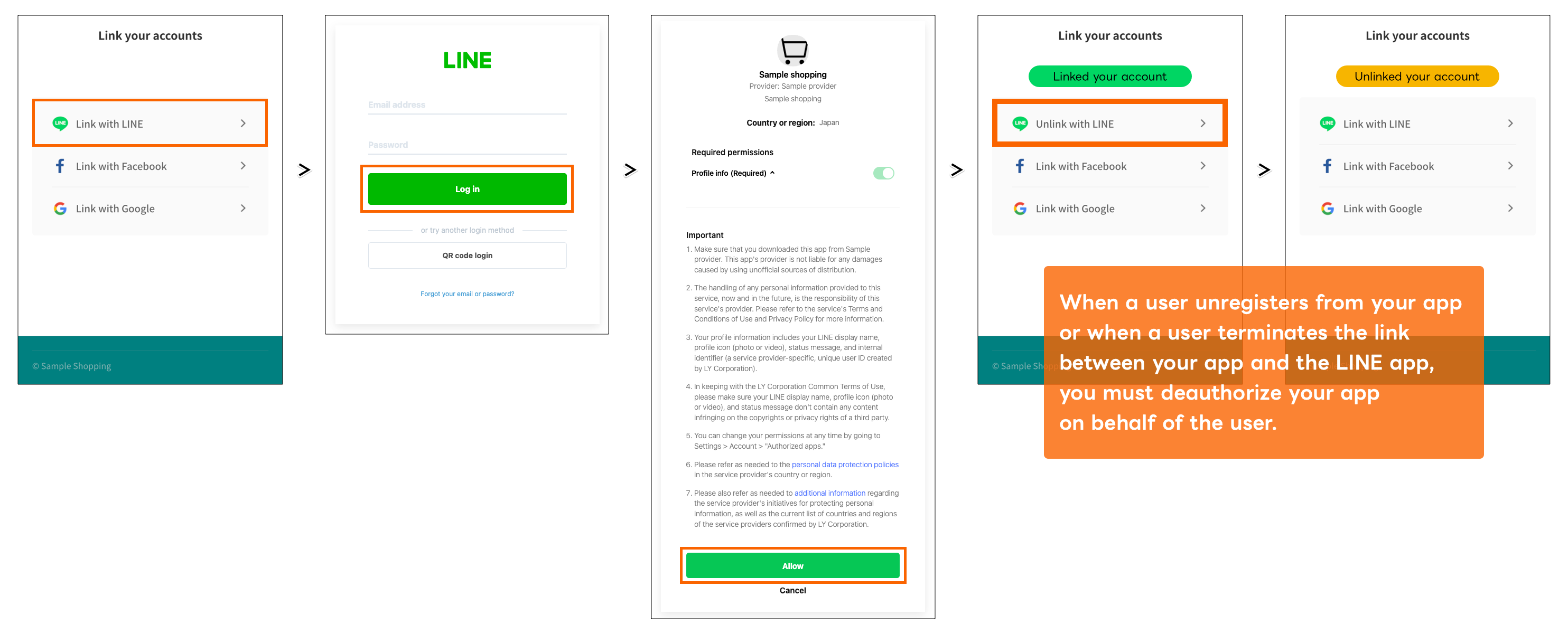LINE MINI App development guidelines
When developing web applications using LIFF, follow these development guidelines.
- Prohibiting mass requests to the LINE Platform
- Saving logs
- Deauthorize your app when a user unregisters from your app
LINE MINI App uses a system provided by LIFF. Therefore, abide by the LIFF app development guidelines in the LIFF documentation.
The basic rules for LINE MINI App development are based on the content described in Terms and Policies.
Prohibiting mass requests to the LINE Platform
Don't over-access LINE MINI Apps via the LIFF scheme (https://miniapp.line.me/{liffId}), or send a large number of requests to the LIFF API or the Service message API, for load testing purposes. For load testing LINE MINI Apps, prepare a test environment that doesn't generate a large number of requests to the LINE Platform.
If the rate limit is exceeded, 429 Too Many Requests will be returned and an error will occur.
Saving logs
We recommend saving logs for Service message API requests for a certain period of time so that developers themselves can smoothly investigate the cause and scope of a problem when it occurs.
Service message API request logs
We recommend saving the following information in a log, in addition to the service notification token notificationToken which is included in the response, when making a request to the Service message API.
- Time when API request was made
- Request method
- API endpoint
- Status codes returned by the LINE Platform
More specifically, save it in a log file using the following format.
| Time when API request was made | Request method | API endpoint | Status code |
|---|---|---|---|
| Mon, 16 Jul 2021 10:20:23 GMT | POST | https://api.line.me/message/v3/notifier/send?target=service | 200 |
Depending on the requirements of the LINE MINI App you're running, the following information, in addition to the above, can be stored for investigation when problems occur.
- Service message API request body
- Response body, other than the service notification token
notificationToken, returned by the LINE Platform after the API request
We don't provide logs of service message API requests, etc. despite inquiries. Logs should be saved by the developers who are developing the LINE MINI Apps themselves.
Deauthorize your app when a user unregisters from your app
When a user unregisters from your LINE MINI App, or when a user terminates the link between your app and the LINE app, you must do the following:
- The permissions that the user has granted to the authorized app must be deauthorized using the Deauthorize your app to which the user has granted permissions endpoint on behalf of the user.
- Write what happens when a user unregisters from your app or terminates the link between your app and the LINE app as follows near the function or in the terms and conditions that the user agrees to at the time of registration or authorization.
- e.g. If you unsubscribe from the service, LY Corporation will be notified that you have unsubscribed and the link between the service and LINE app will be terminated.
- e.g. If you do this, LY Corporation will be notified and the link between the service and LINE app will be terminated.
The following use cases require deauthorization.

When a user logs in to the app that integrates LINE Login with their LINE account and authorize the app on the channel consent screen, the target app will appear in Settings > Account > Authorized apps in the LINE app. Deauthorize the app so that the permissions don't remain authorized after the user unregisters from your app.
For more information about how a user can deauthorize the permissions that the user has granted to the app, see Managing authorized apps in the LINE Login documentation.

